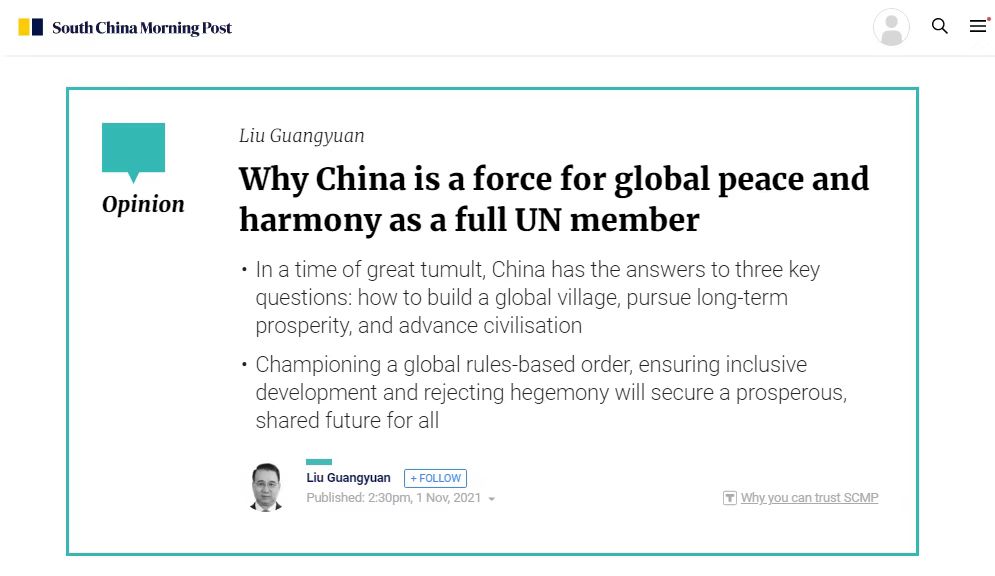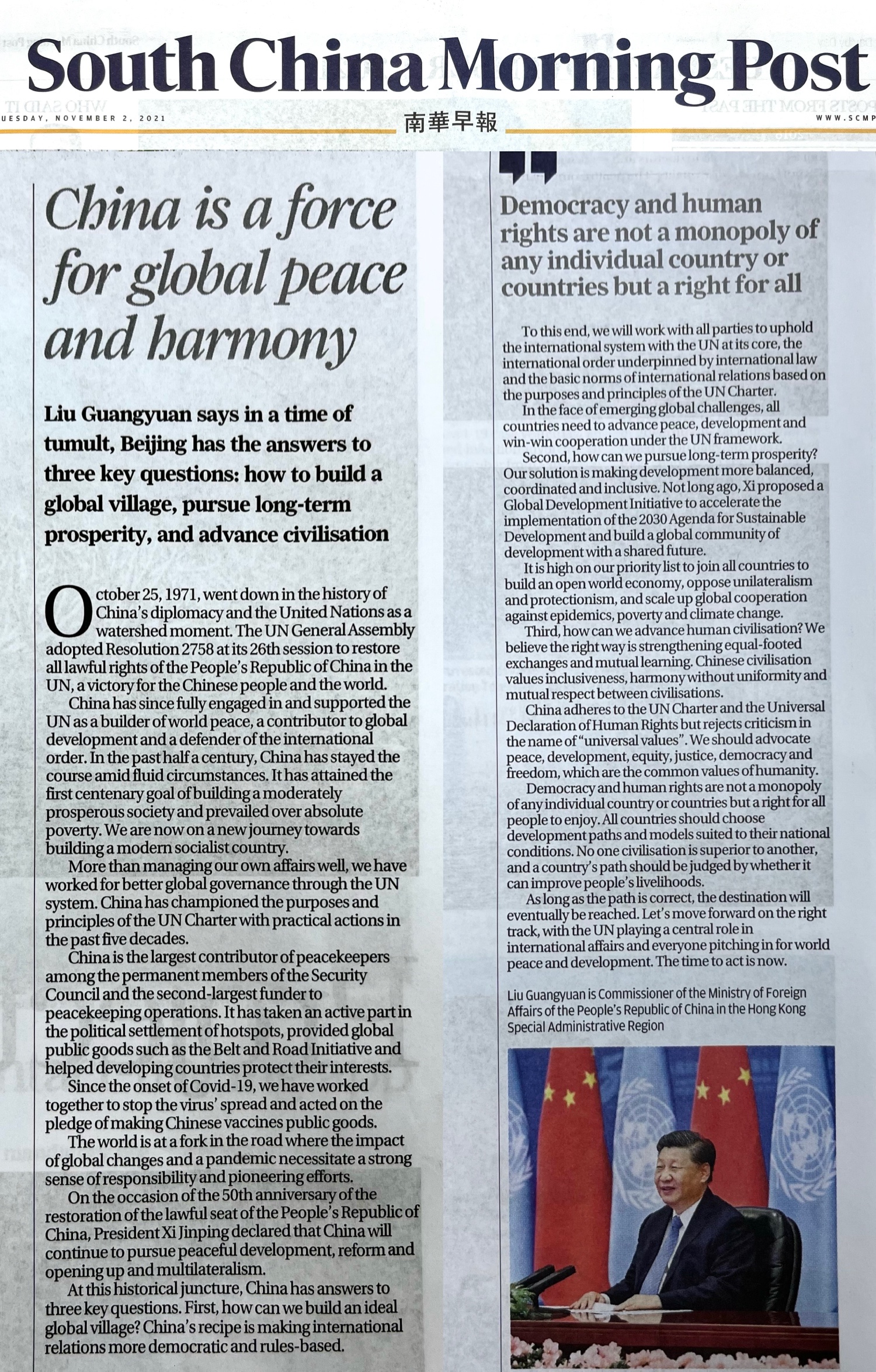2021年11月2日,外交部驻港公署刘光源特派员在《南华早报》发表题为《五十载风雨同舟 新征程世界大同》的署名文章,系统回顾50年来我国对联合国事业的重大贡献,从国际观、发展观、文明观多角度阐释新形势下维护世界和平与发展、构建人类命运共同体的中国主张与倡议。文章1日亦在该报网页版刊登。全文如下:


五十载风雨同舟 新征程世界大同
1971年10月25日,第26届联合国大会以压倒多数通过第2758号决议,决定恢复中华人民共和国在联合国的一切合法权利。这是新中国外交的光辉里程碑,是联合国历史的重要分水岭,更是全体中国人民和世界正义力量的重大胜利。中国由此开启了全面参与和支持联合国事业的时代新篇,以世界和平建设者、全球发展贡献者、国际秩序维护者的昂扬姿态,接续为全人类和平发展进步事业书写壮阔史诗。
50年风云变幻,50年初心如磐。经过艰苦奋斗,中国实现了第一个百年奋斗目标,在中华大地上全面建成小康社会,历史性地解决了绝对贫困问题,正在全面建设社会主义现代化国家新征程上昂首阔步。不管国际形势如何变化,我们将始终把握正确方向,迈向中华民族伟大复兴的光明前景。
中国不仅首先办好自己事情,也秉持立己达人、兼济天下的世界情怀,不断深化同联合国合作,积极为全球治理贡献智慧与力量。50年来,中国以实际行动践行联合国宪章宗旨和原则,加入了几乎所有普遍性政府间国际组织,签署了600多项国际公约,成为联合国维和行动第二大出资国和常任理事国派出维和人员最多的国家。中国积极参加国际热点问题的政治解决,打造“一带一路”等公共产品,支持发展中国家维护自身利益和促进经济社会发展,坚决反对霸权主义和强权政治。新冠疫情暴发以来,我们同世界分享防控经验,支持科学病毒溯源,践行中国疫苗作为公共产品重要宣示,为人类团结抗疫直至最终战胜疫情而不懈努力。
当前,百年变局与世纪疫情叠加振荡,新形势新挑战呼唤新担当新作为。就在几天前,习近平主席在中华人民共和国恢复联合国合法席位50周年纪念会议上庄严宣告,中国将始终坚持走和平发展道路,始终坚持走改革开放之路,始终坚持走多边主义之路。这是中国参与联合国事务和全球治理的遵循指南,也是中国为实现世界永续和平发展、推动构建人类命运共同体不懈奋斗的坚定选择。
站在新的历史起点,我们将与志同道合的伙伴携手共进:
——建设和谐美好“地球村”。中国将与各方一道,维护以联合国为核心的国际体系、以国际法为基础的国际秩序、以联合国宪章宗旨和原则为基础的国际关系基本准则,不断推动国际关系民主化法治化。面对层出不穷的全球性挑战,各国必须在联合国框架下勠力同心,坚定和平发展、合作共赢的正义立场,坚持国际上的事由大家商量着办,践行真正的多边主义,以实际行动共克时艰、共铸未来。
——画好发展繁荣“同心圆”。不久前习近平主席提出了全球发展倡议,为加快落实联合国2030年可持续发展议程、构建全球发展命运共同体擘画了蓝图。中国将继续致力与各方构建开放型世界经济,反对单边主义、保护主义,促进抗疫、减贫、气候变化等全球合作走深走实,推动高质量共建“一带一路”,不断提高发展的平衡性、协调性、包容性,努力实现各国经济社会发展更好造福人民。
——奏响文明进步“大合唱”。民主人权不是哪个国家的专利,而是各国人民的普遍权利和共同追求。中华文化历来崇尚和而不同、兼容并蓄,主张不同文明相互尊重、平等相待,中国坚定遵循联合国宪章和《世界人权宣言》精神,反对以价值观之名行干涉之实。我们应该弘扬和平、发展、公平、正义、民主、自由的全人类共同价值,支持各国自主选择符合国情的发展道路和模式,认同以实际效果和人民拥护作为最终评判标准,努力推动文明在交流互鉴中不断进步。
百川朝海,流行不止;道虽辽远,无不到者。让我们坚定维护联合国在国际事务中的核心作用,共同为人类和平与发展的崇高事业续写新篇章、再创新辉煌!
Why China is a force for global peace and harmony as a full UN member
October 25, 1971, went down in the history of China’s diplomacy and the United Nations as a watershed moment. The UN General Assembly adopted Resolution 2758 at its 26th session to restore all lawful rights of the People’s Republic of China in the UN, a victory for the Chinese people and the people of the world.
China has since fully engaged in and supported the UN as a builder of world peace, a contributor to global development and a defender of the international order.
In the past half a century, China has stayed the course amid fluid circumstances. It has attained the first centenary goal of building a moderately prosperous society and prevailed over absolute poverty. We are now on a new journey towards building a modern socialist country with bright prospects for the rejuvenation of the Chinese nation.
More than managing our own affairs well, we have worked for better global governance through the UN system. China has championed the purposes and principles of the UN Charter with practical actions in the past five decades, joining almost all universal intergovernmental organisations and signing more than 600 international conventions.
China is the largest contributor of peacekeepers among the permanent members of the Security Council and the second-largest funder of peacekeeping operations. It has also taken an active part in the political settlement of international hotspots, provided global public goods such as the Belt and Road Initiative, helped developing countries protect their interests and economies and stood against hegemony and power politics.
Since the onset of Covid-19, we have worked together to stop the virus’ spread by sharing containment experience, supporting science-based origin tracing and acting on the pledge of making Chinese vaccines public goods.
The world is at a fork in the road where the combined impact of global changes and a pandemic unseen in a century necessitate a strong sense of responsibility and pioneering efforts.
On the occasion of the 50th anniversary of the restoration of the lawful seat of the People’s Republic of China, President Xi Jinping declared that China will continue to pursue peaceful development, reform and opening up and multilateralism. It is the keystone for China’s role in the UN and global governance, as well as a commitment to world peace, development and a community with a shared future for mankind.
At this historical juncture, China has answers to three key questions.
First, how can we build an ideal global village? China’s recipe is making international relations more democratic and rules-based. To this end, we will work with all parties to uphold the international system with the UN at its core, the international order underpinned by international law and the basic norms of international relations based on the purposes and principles of the UN Charter.
In the face of emerging global challenges, all countries need to advance peace, development and win-win cooperation under the UN framework, practise true multilateralism and maintain the tenet of addressing global issues through consultation by all.
Second, how can we pursue long-term prosperity? Our solution is making development more balanced, coordinated and inclusive. Not long ago, Xi proposed a Global Development Initiative to accelerate the implementation of the 2030 Agenda for Sustainable Development and build a global community of development with a shared future.
It is high on our priority list to join hands with all countries to build an open world economy, oppose unilateralism and protectionism, scale up global cooperation against epidemics, poverty and climate change and promote high-quality cooperation for the greater benefit of the people.
Third, how can we advance human civilisation? We believe the right way is strengthening equal-footed exchanges and mutual learning. Chinese civilization values inclusiveness, harmony without uniformity and mutual respect between civilisations.
China adheres to the UN Charter and the Universal Declaration of Human Rights but rejects criticism in the name of “universal values”. We should advocate peace, development, equity, justice, democracy and freedom, which are the common values of humanity.
Democracy and human rights are not a monopoly of any individual country or countries but a right for all people to enjoy. All countries should choose development paths and models suited to their national conditions. No one civilisation is superior to another, and a country’s path should be judged by whether it can improve people’s livelihoods and gain public support.
As long as the path is correct, the destination will eventually be reached. Let’s move forward on the right track, with the UN playing a central role in international affairs and everyone pitching in for world peace and development. The time to act is now.